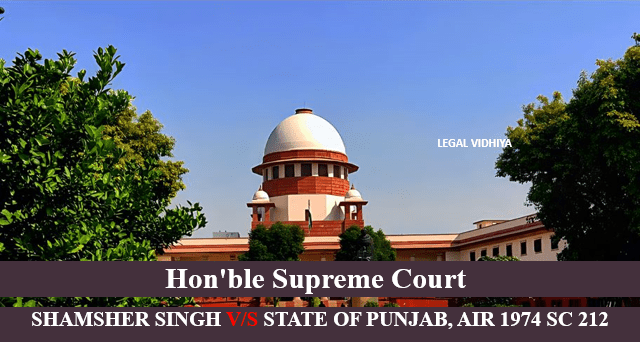
| Citation | AIR 1974 SC 212 |
| Date of Judgment | 23.08.1974 |
| Court | Supreme Court of India |
| Case Type | Civil Appeal Nos. 2289 of 1970 and 632 of 1971 |
| Appellant | SAMSHER SINGH |
| Respondent | STATE OF PUNJAB |
| Bench | Hon’ble Judges/Coram: A.N. Ray, C.J., A. Alagiriswami, D.G. Palekar, K.K. Mathew, P.N. Bhagwati, V.R. Krishna Iyer and Y.V. Chandrachud, JJ. |
| Referred | Article-164(1), 234,74(1),163(1) 0f Indian Constitution. |
FACTS OF THE CASE
The two appellants in this case, Shamsher Singh and Gurdial Singh, were members of the Punjab Civil Service (Judicial Branch). They were both on probation and their probation was terminated by orders of the concerned ministers / Chief Minister in conformity with the recommendations of the High Court under different provisions of relevant rules.
The appellants challenged the termination of their probation in the High Court, arguing that the Governor had no power to terminate their probation without personally considering their cases. The High Court dismissed their petition, holding that the Governor had the power to terminate their probation on the advice of his ministers.
ISSUES
Whether the Governor of a state can exercise his formal constitutional powers, such as the power to appoint and remove members of the subordinate judiciary, without the advice of his ministers.
ARGUMENTS
The appellants argued that the Governor is the constitutional or the formal head of the State and that he can exercise powers and functions of appointment and removal of members of the Subordinate Judicial Service only personally. They relied on the following provisions of the Constitution:
Article 164(1): The executive power of a state shall be vested in a Governor.
Article 234: The appointment of persons to be, and the removal of persons from, any post in the service of a State in connection with the administration of justice shall be made by the Governor in accordance with the provisions of any law made by the State Legislature.
The respondents, on the other hand, argued that the Governor is bound to act on the advice of his ministers in the exercise of his formal constitutional powers. They relied on the following provisions of the Constitution:
Article 74(1): The executive power of the Union shall be vested in the President and shall be exercised by him through the Council of Ministers with the Prime Minister at the head.
Article 163(1): The executive power of a state shall be vested in the Governor and shall be exercised by him either directly or through officers subordinate to him in accordance with the provisions of this Constitution.
JUDGEMENT
The Supreme Court held that the Governor of a state must act on the advice of his ministers in the exercise of his formal constitutional powers, except in a few well-known exceptional situations. The Court held that the power to appoint and remove members of the subordinate judiciary is a formal constitutional power and that the Governor must act on the advice of his ministers in the exercise of this power.
The Court also held that the provisions of Article 234 of the Constitution do not give the Governor any independent power to appoint or remove members of the subordinate judiciary. The Court held that these provisions only require the Governor to act in accordance with the law made by the State Legislature.
The judgment in Shamsher Singh & Anr vs. State Of Punjab is a landmark judgment that has been cited in many subsequent cases. The judgment has been instrumental in upholding the principle of ministerial responsibility in the Indian constitutional system.
REFERENCES
Shamsher Singh and Ors. vs. State of Punjab (23.08.1974 – SC): MANU/SC/0073/1974
739_Apoorva Bhangla, Shamsher Singh v. State of Punjab.docx (live.com)
Written by Anirudh Modi an intern under legal vidhiya.




0 Comments